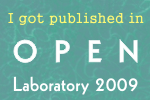A new paper from my lab and Patsy Babbitt’s lab in UCSF has recently been published in PLoS Computational Biology. It is something of a cautionary tale for quantitative biologists, especially bioinformaticians and system biologists. Genomics has ushered biology into the data rich sciences. Bioinformatics, developing alongside genomics, provided the tools necessary to decipher genomic […]
You have until Friday Saturday, April 20th to submit your abstracts to the Automated Function Prediction meeting, an ISMB 2013 Special Interest Group and CAFA: Critical Assessment of Function Annotations. Keynote speakers: Patricia Babbitt, University of California, San Francisco. Protein similarity networks: Identification of functional trends from the context of sequence similarity Alex Bateman, European Bioinformatics […]
The Automated Function Prediction, an ISMB 2013 Special Interest Group meeting and CAFA: Critical Assessment of Function Annotations. July 20, 2013, Berlin Keynote speakers Patricia Babbitt, University of California, San Francisco Alex Bateman, European Bioinformatics Institute Anna Tramontano, “La Sapienza” University, Rome. Key dates: April 20, 2013: Deadline for submitting extended abstracts posters & talks May […]
The Uncanny Valley Every day, software appears to do more things that we thought were exclusively in the human realm. Like beating a grandmaster in chess, or carrying out a conversation. I say “appears” because there is obviously no self-aware intelligence involved, as this rather bizarre conversation between Cleverbots demonstrates. For humans, playing chess and carrying […]
I just received an email from Julian Gough , one of last year’s CAFA participants. He started a Wikipedia initiative on protein function prediction, which are barely stubs at the moment. EDIT: He alerted me to the fact that protein function prediction has virtually no presence on Wikipedia. So all you protein function predictors out there, please contribute. Yes, […]
Nearly a year ago, I posted about the Critical Assessment of Function prediction with which I am involved. The original post from July 22, 2010 is in the block quote. After that, an update about the meeting which will be held in exactly 2 weeks. The trouble with genomic sequencing, is that it is too […]
Last July I introduced CAFA: Critical Assessment of (Gene and Protein) Function Annotations. Recap: the number of genomic and metagenomic sequences is growing at a horrendous rate. We are inundated with sequence data, yet the fraction of useful information we can glean from these sequences is steadily decreasing. There are simply too many sequences, and they are […]
The trouble with genomic sequencing, is that it is too cheap. Anyone that has a bit of extra cash laying around, you can scrape the bugs off your windshield, sequence them, and write a paper. Seriously? Yes, seriously now: as we sequence more and more genomes, our annotation tools cannot keep up with them. It’s […]
Sequencing centers keep pumping large amounts of sequence data into the omics-sphere (will I get a New Worst omics Word Award for this?) There is no way we can annotate even a small fraction of those experimentally and indeed most annotations are automatic, done bioinformatically. Typically function is inferred by homology: if the protein sequence […]
Proteins are the machinery of life, and they facilitate most of life’s functions. Traffic into and out of the cell? Protein pumps, pores and channels. Respiration? Proteins. Metabolism and catabolism? Proteins. Immune system, signaling, development… all complex networks of interacting proteins. Understanding a protein’s structure can tell us a lot about how it performs its […]





